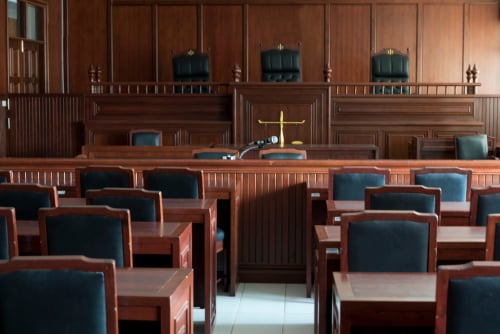To print this article, all you need is to be registered or login on Mondaq.com.
The Saskatchewan Court of King’s Bench recently released its
decision for DW Earnshaw Excavating v 7-Eleven Canada
Inc., 2023 SKKB 252.
The matter involved an application by DW Earnshaw Excavating
(“DW Earnshaw“) to the Court under
section 56(9) of The Builders’ Lien Act (the
“BLA“). A lien claimant whose
registered claim of lien or written notice of a lien has been
vacated but who has not been able to prove his
claim can apply to the Court under section 56(9) of the
BLA [the “Lien Payout
Provision“], after notifying any affected persons,
for an order requiring the money paid into Court be paid out to the
person(s) who are found entitled to receive the funds. DW Earnshaw
relied on this section in its application.
The issues addressed by the Court included the following:
- Does the Lien Payout Provision of the BLA authorize
the Court to determine the validity of liens and order payments to
the entitled person(s)? - Did the claim have to served on the contractor?
FACTUAL BACKGROUND
7-Eleven Canada Inc. (“7-Eleven“) had
hired the contractor BLS Asphalt Inc.
(“BLS“) in 2016 to build a convenience
store in Weyburn, Saskatchewan on a property owned by 7-Eleven (the
“Project“). It was agreed between
7-Eleven and BLS that the Project would cost $1,657,499. BLS hired
multiple sub-contractors to work on the Project. DW Earnshaw was
one of them. 7-Eleven paid BLS the amount of $1,520,653, and BLS
issued a Certificate of Substantial Performance on November 29,
2016, meaning that the contract between the owner and the
contractor had been completed. An amount of $136,846.45 remained
outstanding as part of a holdback agreed to as per the terms of the
contract between 7-Eleven and BLS.
Between November 21, 2016 and February 16, 2017, six
sub-contractors registered claims of lien which were all paid out
by BLS by March 6, 2017. On March 9, 2017, after 7-Eleven approved
contract changes totalling $59,903, two more sub-contractors
registered their claims of lien on March 9, 2017 and April 6, 2017
respectively (the “last two liens“). On
March 29, 2017, 7-Eleven released the holdback on the understanding
that BLS would use it to discharge the first lien registration and
to pay any other claims of lien.
7-Eleven then applied to the Court to vacate the last two liens
on payment into Court of the full amount claimed plus security for
costs. The amount of $59,903 plus GST was paid into Court by
7-Eleven in accordance with an order that was made pursuant to s.
56(2) of the BLA. By doing so, the liability of 7-Eleven
became limited to the affected lien claimants, thus vacating all
liens from 7-Eleven’s property, and leaving the lien claimants
to apply to Court for money owed.
APPLICATION FOR PAYOUT OF LIEN FUNDS
DW Earnshaw, one of the lien claimants, applied for payment of
the funds out of court relying on the Lien Payout Provision of the
BLA, and asked that the funds be paid out on a pro-rata
basis to all lien claimants with a valid claim. DW Earnshaw also
asked for the Court’s directions about the process for lien
claimants to prove their lien claims. All other lien claimants
argued that no such instruction was necessary because they had
already filed with the Court sufficient evidence showing the
validity and amount of their lien claims.
JUDGMENT FROM THE COURT OF KING’S BENCH
The Court was unable to grant the order that DW Earnshaw was
seeking and dismissed the application without limiting the ability
of the remaining lien claimants to bring further applications that
would be supported by evidence validating their lien claims –
provided that advance notice was given to the affected parties.
The Court acknowledged that the amount of the funds in court was
limited. However, while the BLA directs that the procedure
is to be summary (or simplified) in nature in order to reduce
expenses related to the enforcement of liens, the Lien Payout
Provision of the BLA did not apply in the circumstances
before that Court. The provision was intended for lien claimants
who cannot prove their claim in situations where liens had been
vacated. The provision did not provide a mechanism for the Court to
determine the validity of lien claims.
The Court explained that the relief sought by DW Earnshaw could
only be granted after the Court determined who was entitled to the
funds and what the proportionate share was between the entitled
persons. Further, DW Earnshaw could apply for a relatively quick
determination of the matter by bringing a summary judgement
application before the Court. None of the lien claimants had made
such an application, and only DW Earnshaw had provided evidence of
the amount it was owed by the contractor.
Further, the contractor had not been properly notified of the
application. Therefore, even if the Lien Payout Provision of the
BLA had applied in the circumstances, the Court would not
have granted the remedy sought.
KEY TAKEAWAYS
The decision in DW Earnshaw Excavating v 7-Eleven Canada
Inc affirms that the purpose of the Lien Payout Provision of
the BLA is to provide a mechanism for the payout of funds paid into
court in order vacate lien registrations, not to determine whether
the liens were valid in the first place. Further, in situations
where the provision applies, the decision underscores the necessity
of ensuring that all procedural requirements for seeking a remedy
have been met.
The content of this article is intended to provide a general
guide to the subject matter. Specialist advice should be sought
about your specific circumstances.
POPULAR ARTICLES ON: Corporate/Commercial Law from Canada
#Saskatchewan #Court #Kings #Bench #Affirms #Purpose #Lien #Payout #Provision #Builders #Lien #Act #Contracts #Commercial #Law











